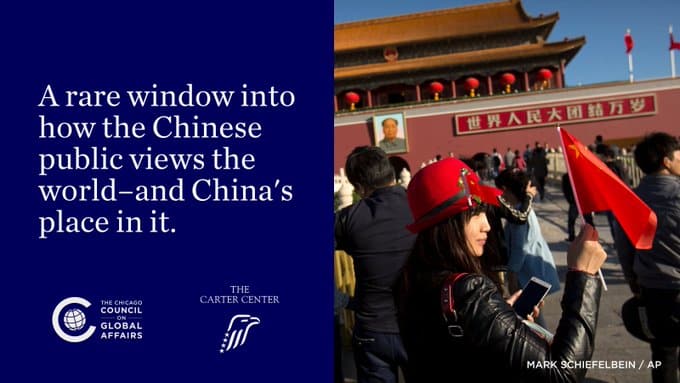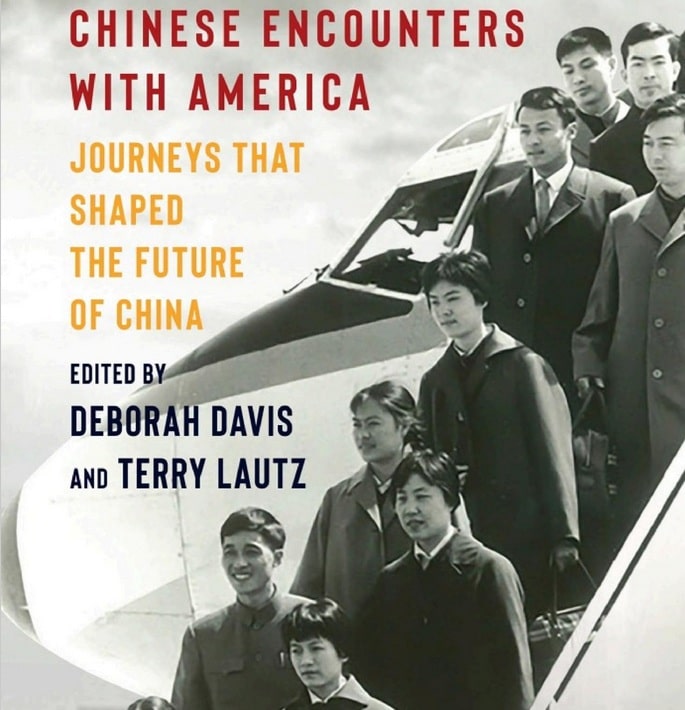An Interview with Rachel Myrick: The Impact of Partisan Politics on U.S. Foreign Policy
- Interviews
 Juan Zhang
Juan Zhang- 06/04/2024
- 0
[Editor’s Note: An indisputable fact is that the partisan divide between the Democrats and Republicans in the United States is increasing severely. The two parties find it challenging to reach a consensus on a range of domestic issues, such as immigration, abortion, and gun control. What impact do these partisan politics have on U.S. foreign policy? As China increasingly becomes America’s primary competitor, can the U.S.-China competition unite the Democrats and Republicans? Does the partisan divide in the U.S. embolden rival nations? To explore these questions, The U.S.-China Perception Monitor recently interviewed Rachel Myrick, Douglas and Ellen Lowey Assistant Professor of Political Science at Duke University.]
Since the Ukraine war began, many scholars have compared the Russia-Ukraine war to the Taiwan situation, specifically the possibility of China fighting Taiwan with direct aid from the West. What is your take on this comparison?
Myrick: I would first note that while there are interesting parallels between the Russia-Ukraine and China-Taiwan relationships, it’s important not to overstate the similarities. Some key differences between these scenarios, for example, are the mechanics of a hypothetical invasion of Taiwan versus what we’ve witnessed in Ukraine, the strategic value of Taiwan to the U.S., and the degree of economic interdependence between the U.S. and China.
However, it’s reasonable to ask what China might be learning from the Russia-Ukraine war. One question that’s received a lot of attention is whether the U.S. response to Russia’s invasion of Ukraine has implications for Chinese thinking on Taiwan. My colleague Chen Wang and I were interested in this question and, shortly after the initial invasion of Ukraine in February 2022, we collaborated on a public opinion survey in China to investigate it. What we found in the survey is that the initial U.S. response to the Russia-Ukraine war didn’t substantially change Chinese perceptions of U.S. willingness to defend Taiwan, nor did it change attitudes towards Taiwan policy in general. In large part, this is because the Chinese public views these two situations as very different and, unsurprisingly, has strong prior beliefs on the Taiwan issue that are unchanged by expectations about U.S. policy towards Taiwan.
Importantly, our study was conducted in the early phase of the Russia-Ukraine war, just a month after the invasion, when outcomes of the conflict were unclear. As the war continues to unfold, it is likely that China has learned new things. For example, Chinese leadership is learning from the unified response of Western-led sanctions, which could lead China to be more proactive in seeking out international partnerships that are alternatives to the West. In addition, poor Russian military performance following the initial invasion emphasized to Chinese leadership that overwhelming advantages in combat power don’t guarantee swift victories.
American domestic politics are becoming increasingly polarized. The two parties have a hard time agreeing on many issues, such as gun control, abortion, and immigration. Will this domestic polarization affect the U.S.’s approach to foreign policy? If so, in what ways?
Myrick: While everyone agrees that American politics are becoming more polarized, there are disagreements about the extent to which domestic polarization will affect foreign policy. I tend to believe that heightened polarization will have increasingly negative impacts on U.S. foreign policymaking. I’m working on a book project about the ways that extreme polarization impacts foreign affairs, and it emphasizes three possible effects of polarization.
The first is that growing polarization could create more volatility in U.S. foreign policy. In highly polarized environments, politicians have incentives to actively oppose or even undermine the foreign policymaking of a non-bipartisan president. We see, for example, presidential candidates from the party that is out of power orienting a lot of their foreign policy around undoing the accomplishments of the incumbent.
The second is the potential for more extreme forms of polarization to erode the credibility of the U.S. as an adversary. Typically, a unified, bipartisan response to foreign threats enhances the credibility of a democracy in the eyes of its adversaries. But in a polarized society, where the opposition has incentives to obstruct democratic leaders, this type of bipartisanship becomes less likely, jeopardizing a unified response.
The third effect is that polarization reduces the ability of the U.S. to maintain its commitments to its allies and partners. It makes leaders more willing and better able to bypass institutional constraints to secure wins for their own party. This means that international commitments are less likely to be made with bipartisan support. For example, it is now exceptionally hard to pass a major international treaty in a polarized Congress. Therefore, we increasingly see presidents using executive agreements and similar tools to enact their foreign policy agenda, which are less durable than treaties.
Not all of these effects have been fully realized in the United States, but my concern is that as polarization continues to grow, we’ll see these more troubling implications for foreign policymaking start to materialize.
One common explanation for today’s polarized politics in the U.S. is that it does not have a formidable common foreign threat; for example, how the Soviet Union acted as a common enemy to the West during the Cold War. As China becomes a primary strategic competitor, Republicans and Democrats seem to be agreeing on issues related to China. Will China become the new Soviet Union and help unite the two parties in the U.S.?
Myrick: I’m skeptical of popular claims that foreign threats like the China threat will be inherently unifying in an era of heightened polarization. Polarization is complex and multicausal. As much research in American politics demonstrates, there’s not a silver bullet for reducing extreme partisanship. I have also shown in previous research that historically, the U.S. response to international crises tends to reflect the domestic partisan dynamics already at play.
Rather than the “China threat” uniting the country, I think two trends are more likely, one positive and one negative. On the positive side, we’ll continue to see bipartisan legislation on dimensions of China policy where there is broad agreement between Republicans and Democrats. For example, legislation that aims to enhance the economic competitiveness of the U.S. vis-à-vis China, condemn human rights abuses in China, and so forth. However, I think it’s unlikely that this collaboration will spill over into other aspects of domestic affairs or reduce Congressional polarization writ large.
On the negative side, I also think heightened polarization – particularly in conjunction with national elections – could increasingly lead to an “outbidding” dynamic where Republican and Democratic candidates for national office become increasingly hawkish on China. If the U.S.-China rivalry continues to intensify, neither side will want to be perceived as “soft on China.” My concern is that, further down the road, this dynamic could have the potential to inadvertently escalate tensions between the U.S. and China.
Scholars from both the U.S. and China have long harbored the belief that the U.S.’s polarized politics benefit China because they bolster China’s confidence to push through more policies. In your research, what have you found pertaining to this theory?
Myrick: We certainly see lots of examples of Chinese state media emphasizing the problems with democracy in the United States. There was extensive coverage, for example, of the January 6th attacks on the U.S. Capitol, the Black Lives Matter protests in 2020, and the general partisan divide between Republicans and Democrats. But it’s an open question as to whether America’s partisan politics are actually affecting Chinese foreign policy.
In another paper with Chen Wang, we look at whether China is more assertive vis-à-vis the U.S. as a function of polarization, per se. We basically find that there isn’t compelling causal evidence that increased assertiveness of China towards the United States is attributable to polarization in the U.S. Instead, Chinese rhetoric around American democracy is mainly directed at the Chinese public and seems invoked to delegitimize liberal democracy. But I’m not sure we have good evidence that polarization in the U.S. is impacting Chinese foreign policy yet. One way that could change, of course, is if we start seeing major differences between the Republican and Democratic parties on China policy.
Since World War II, has there been a period of time where the two parties were united on foreign policy, creating some consistency? If so, could you give us one or two examples?
Myrick: I actually think that most scholars of international relations would argue that the core tenets of U.S. foreign policy remained consistent during the latter half of the twentieth century and the beginning of the twenty-first century. These are the foundational elements of a post-WWII international order, including commitments to rule of law, liberal democratic values, and an open world economy. While we periodically see some of these principles called into question, the broad contours of foreign policy have been pretty similar across Republican and Democratic administrations during this era.
What I do think we’re seeing, however, is disunity between the parties in certain domains of foreign policy. I can provide two quick examples. First, we’re seeing more polarization around foreign policy issues that are linked to social identity. Because partisan identity increasingly correlates with other dimensions of social identity in the U.S., it’s easy to politicize foreign policies that can be connected to race, gender, sexuality, and other salient social identities. So, for example, immigration and refugee policies, which are interwoven with ethnic and racial identities, have become much more politicized. Second, we’re seeing much less unity between the parties in non-traditional areas of security, like climate security, global health security, human security, and so forth. The politicization of climate change policy over the last two decades and of policies surrounding the COVID-19 pandemic are clear examples here.
During your extensive research on the interaction of domestic polarization and foreign policy, have you discovered any issues that might unite the country and reduce the polarization?
Myrick: There are definitely foreign policy issues that are more conducive to bipartisanship. Political scientist Jordan Tama at American University has a great new book on the creation and maintenance of bipartisan legislative coalitions on foreign policy issues. However, I don’t expect a singular foreign policy issue to substantially and persistently reduce either Congressional polarization or the affective polarization in American society. This is largely because even issues or events that initially appear unifying can be subject to politicization. Our country’s reaction to recent major international crises has been instructive. For example, both the Biden administration’s early response to Russia’s invasion of Ukraine in February 2022 and to Hamas’s terror attack on Israel in October 2023 began with quite broad bipartisan Congressional support. Over time, however, these policies have become politicized by more extreme voices.
The only foreign policy issue that might unite the country is a very extreme and direct foreign threat. Historically, we’ve seen heightened national unity after direct attacks on the homeland like, for example, Pearl Harbor or 9/11. But that type of direct attack, or the rapid intensification of a very severe international rivalry, is clearly not something we would wish to happen in this country. So ultimately, I think it’s best not to look to international politics to resolve our domestic problems.
Author
-

Juan Zhang is a senior writer for the U.S.-China Perception Monitor and managing editor for 中美印象 (The Monitor’s Chinese language publication).







